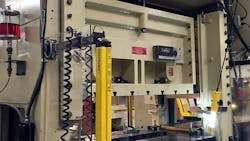Small Business Wins in Connecticut with Public Private Collaboration
A few years ago Connecticut had an enviable challenge. The manufacturing sector saw strong growth ahead and companies were concerned how they were going to keep up.
Catherine Smith, the commissioner of the Connecticut Department of Economic and Community Development, and Gov. Dannel Malloy went directly to the manufacturers seeking solutions.
“What we heard loud and clear is that our local companies, mostly midsized and small, felt there were growth opportunities in aerospace and shipbuilding, in particular, and they were concerned about being able to meet the needs of the OEMs that were increasing production,” explains Smith.
The state knew that it had to make an investment to ensure that the smaller companies would be able to provide the supply chain with necessary products.
The result was the creation of the Manufacturing Innovation Fund. It started in 2014 and last year was funded at $70 million. This year $60 million will be available. The fund’s goal is to keep the state's advanced manufacturing competitive.
Components of the fund include the Incumbent Worker Training Program, which helps employers keep their workers’ skills up-to-date, and the Apprenticeship Program, which helps companies turn trainees into skilled advanced-manufacturing workers.
An important element of the fund is the Manufacturing Voucher Program (MVP) which provides companies vouchers ranging from $5,000-$50,000 to be used for the purchase of specialized expertise that will help improve operations, including marketing, LEAN, compliance, and other technical assistance.
This fund has served more than 180 companies since 2014. With these funds 71% of the companies have purchased equipment, while 17% have used the money for training and 12% for new software, according to the CT Post.
Here are a few examples of companies that have benefited from the program:
- Rowley Spring and Stamping, located in Bristol, Conn., needed a new type of power press that allows the company to de-bug new tools away from the production line. With the help of a $50,000 MVP grant, Rowley bought the new $131,000 press. With the increased capacity, Rowley has added a second shift of workers in its power-press area. “We would not have bought that machine without the help of the Voucher Program,” said John Dellalana, Rowley president.
- Unified Sports Inc., located in Waterford, Conn., wanted to resume producing a line of custom equipment for gymnasiums, such as basketball backstops, volleyball nets and batting cages for baseball and softball. The company needed more space to produce those items. A $10,250 MVP grant helped Unified Sports reconfigure its facility to accommodate production. The results? “We exceeded our first-year sales estimate of $1.5 million by over $250, 000,” said Elaine Adams, the company’s controller.
- Okay Industries, with facilities in New Britain and Bristol, Conn., designs and builds custom automation equipment used to assemble medical devices to customers’ specifications. Making these products is complex, but the company decided that a Fanuc robot could simplify and accelerate the process. A $50,000 MVP grant helped Okay Industries with the $162,000 purchase of the robot and accessories. The new robot will increase the factory’s capacity by as much as 15%. “The way we’re able to do well is to be innovative and get into technology that’s ahead of everyone else,” said Jim DeVecchis, Okay engineering program manager.
Investment in Education
To ensure that the skill level of the workforce will be able to meet the demand,the state has been improving its community college education system.
The state has set up a program where students can earn a certificate in aerospace, submarines, biomedical technology and other fields in less than 10 months. The Advanced Manufacturing Technology Centers, which hosts the program, reports that the cost is as low as $1,000 out of pocket and the placement rate is 98%.
The centers recently got additional support in May when several manufacturers including Sikorsky, Pratt & Whitney and Electric Boat partnered with them to pair graduates with available jobs identified by the manufacturers.
To kick-off the partnership, Gov. Malloy launched a “300 Jobs, 300 Days” campaign to enroll and graduate a minimum of 300 students beginning in the upcoming fall 2016 semester.
The continual collaboration between the public and private sector is why Commissioner Smith feels hopeful that the state will add even more jobs to the sector this year than last.
“Our board teams is comprised of both government agencies and people running successful manufacturing companies, whether it is large, mid-sized and small, which enables us to focus on the solutions we need,” says Smith.
